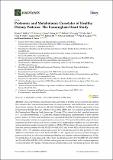Proteomic and metabolomic correlates of healthy dietary patterns: the Framingham Heart Study
Author(s)
Walker, Maura E.; Song, Rebecca J.; Xu, Xiang; Gerszten, Robert E.; Ngo, Debby; Clish, Clary; Corlin, Laura; Ma, Jiantao; Xanthakis, Vanessa; Jacques, Paul F.; Vasan, Ramachandran S.; ... Show more Show less
Downloadnutrients-12-01476.pdf (2.577Mb)
Publisher with Creative Commons License
Publisher with Creative Commons License
Creative Commons Attribution
Terms of use
Metadata
Show full item recordAbstract
Data on proteomic and metabolomic signatures of healthy dietary patterns are limited. We evaluated the cross-sectional association of serum proteomic and metabolomic markers with three dietary patterns: the Alternative Healthy Eating Index (AHEI), the Dietary Approaches to Stop Hypertension (DASH) diet; and a Mediterranean-style (MDS) diet. We examined participants from the Framingham Offspring Study (mean age; 55 years; 52% women) who had complete proteomic (n = 1713) and metabolomic (n = 2284) data; using food frequency questionnaires to derive dietary pattern indices. Proteins and metabolites were quantified using the SomaScan platform and liquid chromatography/tandem mass spectrometry; respectively. We used multivariable-adjusted linear regression models to relate each dietary pattern index (independent variables) to each proteomic and metabolomic marker (dependent variables). Of the 1373 proteins; 103 were associated with at least one dietary pattern (48 with AHEI; 83 with DASH; and 8 with MDS; all false discovery rate [FDR] ≤ 0.05). We identified unique associations between dietary patterns and proteins (17 with AHEI; 52 with DASH; and 3 with MDS; all FDR ≤ 0.05). Significant proteins enriched biological pathways involved in cellular metabolism/proliferation and immune response/inflammation. Of the 216 metabolites; 65 were associated with at least one dietary pattern (38 with AHEI; 43 with DASH; and 50 with MDS; all FDR ≤ 0.05). All three dietary patterns were associated with a common signature of 24 metabolites (63% lipids). Proteins and metabolites associated with dietary patterns may help characterize intermediate phenotypes that provide insights into the molecular mechanisms mediating diet-related disease. Our findings warrant replication in independent populations. Keywords: dietary patterns; diet quality; proteomic; metabolomic; biomarker
Date issued
2020-05Department
Broad Institute of MIT and HarvardJournal
Nutrients
Publisher
Multidisciplinary Digital Publishing Institute
Citation
Walker, Maura E., et al., "Proteomic and metabolomic correlates of healthy dietary patterns: the Framingham Heart Study." Nutrients 12, 5 (May 2020): no. 1476 doi 10.3390/nu12051476 ©2020 Author(s)
Version: Final published version
ISSN
2072-6643